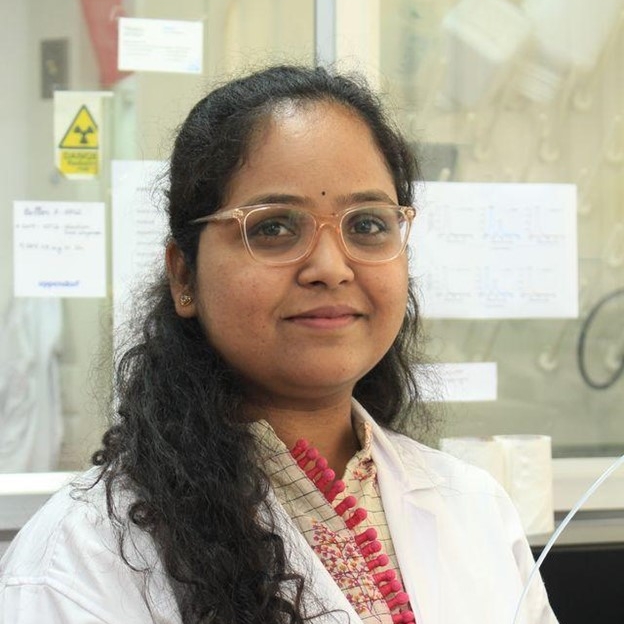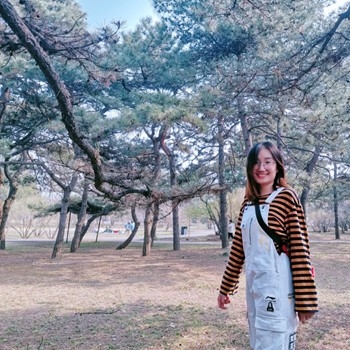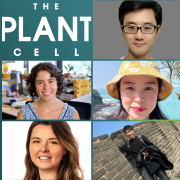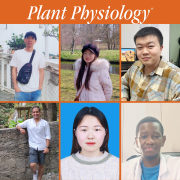Plant Physiology Spotlights August 2024 First Authors
Behind the Plant Physiology manuscripts are researchers, professors, professionals and students dedicated to advancing the field of plant science. You’ve seen our First Authors on Facebook and Twitter — now, read more about why they chose to pursue plant sciences and click on the links below to read their articles.
 Constance Le Gloanec
Constance Le Gloanec
Constance Le Gloanec (she/her) is the First Author of Modulation of cell differentiation and growth underlie the shift from bud protection to light capture in cauline leaves published 06 August 2024. She is a Research Fellow, National University of Singapore, Department of Biological Sciences, MechaPlant Lab. Education background includes 2023 PhD, Plant Biology, Institut de Recherche en Biologie Végétale de l’Université de Montréal (Montréal, QC, Canada) – 2018 MSc, Plant Integrative Biology and Breeding, Université Clermont-Auvergne (Clermont-Ferrand, France) – 2018 Associate degree, VetAgro Sup Campus Agronomique (Clermont-Ferrand, France). Research interests include Plant growth and development, Plant biomechanics.Personal interests include Boxing.
“I’ve always loved biology and knew early on that I wanted a career in science, though as a child, I was aiming to become a veterinarian specializing in equines and dolphins. My interest in plant science grew during my agronomy training and was solidified during an Erasmus semester where I studied plant biotechnology. Interning in two plant physiology labs, one in Germany and one in Italy, further ignited my passion for plant development and physiology. During my master’s, I studied organogenesis at the cellular level, which deepened my curiosity about plant morphology. This led to my Ph.D. research, where I explored the link between growth, differentiation, and genetics in organogenesis, further fueling my fascination with plant science. Now, I aim to integrate mechanical cues into growth and development to better understand how morphogenesis is fine-tuned to achieve robust organ shapes.
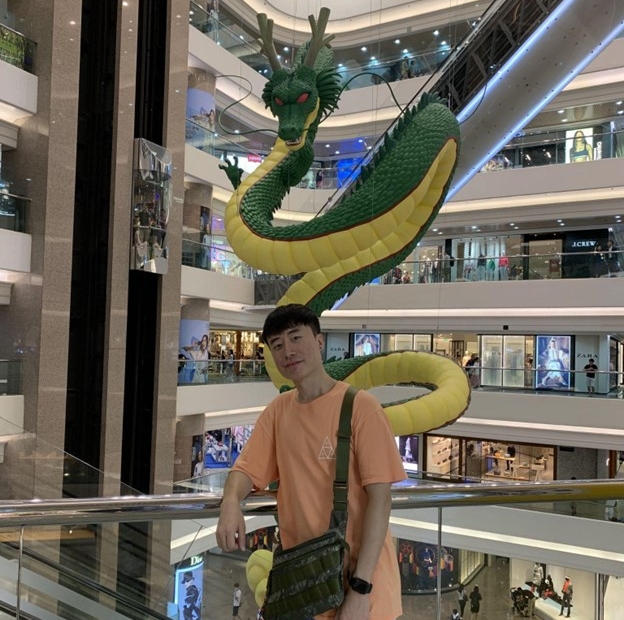 Zhongyuan Liu
Zhongyuan Liu
Zhongyuan Liu (he/him) is the First Author of Mucilage secretion from the root cap requires the NAC family transcription factor BEARSKIN2 published 08 August 2024. Liu is a Post-doctoral Researcher at The Chinese University of Hong Kong. Education background includes 2023 Ph.D Cell and Molecular Biology at The Chinese University of Hong Kong; 2017 MSc Biochemistry and Molecular Biology at Nanjing Agricultural University; 2014 BSc Biological Science at Sichuan Agricultural University. Research interests include Root development, Root cap, Plant cell wall, Autophagy.Personal interests include Gym, Console gaming, Anime.
“I am interested in small things that my eyes can barely see, so I like microscopy. The first glass slide that I have ever seen is a horizontal plant tissue section, in which you can see the different colors of the cell wall staining and various shapes between different cell types. That’s how I became interested in plant science.”
 Trang Dang
Trang Dang
Trang Dang (she/her) is the First Author of Starch metabolism in guard cells: At the intersection of environmental stimuli and stomatal movement published 08 August 2024. Dang is a PhD student at ETH Zurich. Education background includes: 2018 BSc in Biotechnology, Vietnam National University of Agriculture, Vietnam; 2020 MSc in Plant Genetics and Breeding, European Joint Master Degree Program Erasmus Mundus, Universidad Politécnica de Valencia (Spain) and Institut Polytechnique Unilasalle (France). Research interests include Starch metabolism, Plant-environment interactions, Genetic engineering.Personal interests include Cooking, painting, reading light novels.
“Just like all living creatures, plants move, and their movement is essential for life on Earth. These movements are usually at microscopic scales, requiring patience and love to observe and understand. For me, the quietness of the plant kingdom speaks volumes, and it’s this silent beauty of plant science that I am passionate about pursuing throughout my career.”
Bikash Baral
Bikash Baral is the First Author of Seeing the invisible – tools to teach and study plant transcriptional responses published 14 August 2024. Baral is a Post-doctoral researcher, Organismal and Evolutionary Biology Research Programme, Faculty of Biological and Environmental Sciences, and Viikki Plant Science Centre, University of Helsinki, FI-00014 Helsinki, Finland. Education background includes 2022 PhD in Biochemistry, University of Turku, Finland 2015 MSc in Biotechnology, University of Helsinki, Finland 2009 MSc in Botany (Plant Biotechnology and Plant Biochemistry), Tribhuvan University, Nepal.
Research interests include Plant stress biology, Metabolic engineering, Metabolites. Personal interests include Hiking to high altitudes, Travelling, Watching documentaries.
“My deep-seated interest in plant biology is stimulated by various benefits that plants offer to both the environment and humanity. Since plants are the primary producers, they form the cornerstone of the food web, supplying essential nutrients that sustain human life. They act as the planet’s respiratory system, generating oxygen and storing carbon dioxide through photosynthesis, thereby playing a pivotal role in mitigating climate change. In addition, plants significantly enhance air quality by filtering pollutants and supporting biodiversity through their diverse ecosystems. Furthermore, the therapeutic value of plants in human health is immense and well-documented. They are the source of a myriad of medicinal compounds with high therapeutic indices, used to treat a wide array of health conditions. Many modern drugs have been developed from these phytochemicals, which include alkaloids like quinine and morphine as well as flavonoids and glycosides. Plant-based medications continue to be important, as seen by their prominent place in traditional medicinal systems, such as Ayurveda and Traditional Nepalese Medicine. This complex web of ecological and therapeutic advantages emphasizes the essential role of plants, stimulating my interest and drawing me into the vibrant field of plant science.”
 Chen Chen
Chen Chen
Chen Chen is the First Author of Chromosome-specific painting reveals the Y genome origin and chromosome rearrangements of the St genome in Triticeae published 19 August 2024. Chen is a PHD student at Sichuan Agricultural University. Education background includes September 2021 – Present: Ph.D. Candidate, Sichuan Agricultural University / Joint Ph.D. Candidate, The University of Sydney / Joint Ph.D. Candidate, Western Sydney University. September 2017 – June 2020: Master’s Degree, Sichuan Agricultural University. September 2013 – June 2017: Bachelor’s Degree, Jilin Institute of Chemical Technology. Research interests include: Chromosome Evolution, Adaptive Evolution, Molecular Biology. Personal interests include: Playing the piano, Reading.
“My love for plant science really stems from a mix of awe and curiosity. There’s something truly mesmerizing about how plants grow, adapt, and sustain life on Earth. They provide us with oxygen, food, and even medicine. Delving into the science behind these processes is incredibly fulfilling for me. Plus, knowing that my research can help tackle big issues like food security and climate change gives my work a deeper sense of purpose. This combination of personal fascination and the potential to make a real-world impact keeps me passionate about plant science.”
 Brian Críostóir Mooney
Brian Críostóir Mooney
Brian Críostóir Mooney (he/him) is the First Author of Hypoxia represses pattern-triggered immune responses in Arabidopsis published 19 August 2024. Postdoctoral Researcher at the University of Oxford. Education background includes 2022 Ph.D in Biology at Maynooth University, 2010 BSc in Functional Biology at Trinity College Dublin. Research interests include Plant-pathogen interactions, proteolysis.Personal interests include Music. football, squash.
“I have been fascinated by biology since childhood. During my studies, I became particularly interested in host-pathogen interactions, and the deeply complex interplay between immune responses and pathogen mechanisms of virulence. Beyond scientific curiosity, I think that the study of plant-pathogen interactions will be critical to develop resilient crops that can ensure global food security in the years ahead.
After almost 7 fantastic years working with Dr. Emmanuelle Graciet at Maynooth University near my hometown in Ireland, since 2022 I have been working with Prof. Renier van der Hoorn at the University of Oxford using chemical proteomics and AI to investigate apoplastic immunity.”
Jin Cheng
Jin Cheng (she) is the First Author of Molecular interactions of the chaperone CcmS and carboxysome shell protein CcmK1 that mediate β-carboxysome assembly published 22 August 2024. Cheng is a P.h.D at Ocean University of China. Education backghruond includes 2021 Master of Biology, Ocean University of China ; 2017 Bachelor of Biological Sciences from Shandong Normal University. Research interests include Plant photosynthesis. Personal interests include Reading novels, Painting, Badminton.
“I got my bachelor’s degree in College of Life Sciences, Shandong Normal University. During my sophomore year, I entered the lab to conduct research on plant stress resistance. I think plants are amazing, and even though they can’t move, they have evolved over time to adapt to various stresses, and I’ve become interested in plants. Later, I entered the group of Prof. Yuzhong Zhang, School of Marine Life Sciences of Ocean University of China, and carried out research related to photosynthesis under the guidance and help of Prof. Yuzhong Zhang and Prof. Luning Liu. With the help of Prof. Yuzhong Zhang and Prof. Luning Liu, I studied the components of carboxysomes, a carbon-fixed natural organelle within cyanobacteria. Our results provide structural insights into how auxiliary factors including CcmS mediate β-carboxysome assembly in many cyanobacteria.”
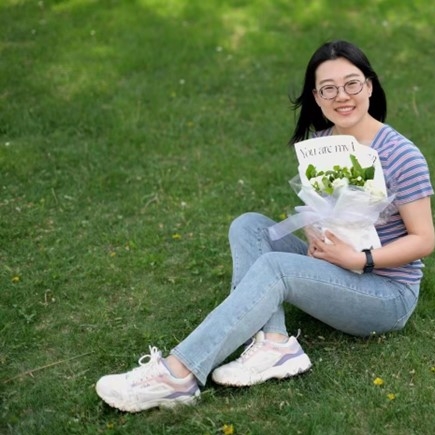 Hongjie Li
Hongjie Li
Hongjie Li(she) is the First Author of The Complexity of Volatile Terpene Biosynthesis in Roses: Particular Insights into β-Citronellol Production published 26 August 2024. Li is a Ph.D candidate from Key Laboratory of Molecular Epigenetics of MOE, Northeast Normal University, China.Education background includes 2017-2020: Master, Jilin Agricultural University, China 2013-2017: Bachelor, Jilin Agricultural University, China. Research interests include Flower scent, Rose, Genetics. Personal interests include Running, Movie, Travel.
“I commenced my Ph.D. studies in Genetics at Northeast Normal University in 2020 under the supervision of Professor Xiang Gao and Associate Professor Yueqing Li. My research focuses on elucidating the biosynthetic pathways of volatile terpenoids in roses. Floral scent is a critical ornamental trait of roses. However, during the domestication of Rosa species, the floral fragrance of roses, particularly cut roses, has gradually diminished. Therefore, understanding the biosynthetic pathways controlling the major floral scent components is essential for further molecular breeding.
In this study, we systematically analyzed the floral scent components of various heritage and modern roses. Using the modern cultivar Rosa hybrida ‘Double Delight’ as a model system, we investigated the biosynthetic pathways of volatile terpenoids. Our results revealed that terpene synthase (TPS) play an important role in the synthesis of rose volatile terpenoids, responsible for the production of all volatile terpenoids except geraniol and its derivatives such as citral, citronellal, and citronellol.
Further investigations demonstrated that geraniol and its derivatives, which substantially contribute to rose fragrance, primarily rely on the mevalonate (MVA) pathway. Cytosolic geranyl/farnesyl diphosphate synthase 1 (G/FPPS1) and Nudix hydrolase 1-1a (NUDX1-1a) were identified as key enzymes in this process. Through systematic exploration and functional characterization of genes from the short-chain dehydrogenase/reductase (SDR) family, the medium-chain dehydrogenase/reductase (MDR) family, and the old yellow enzyme (OYE) family, we elucidated the biosynthetic pathway from geraniol to citral, citral to citronellal, and citronellal to citronellol. Additionally, we demonstrated that the pathway for converting geraniol to citronellol may be conserved in other horticultural plants such as Lagerstroemia caudata and Paeonia lactiflora. Our work provides valuable insights into the biosynthesis of volatile terpenoid compounds in roses and offers essential genetic resources for future breeding and molecular modification efforts.”
Pullagurla Naga Jyothi
Pullagurla Naga Jyothi (she/her) is the First Author of Orchestration of phosphate homeostasis by the ITPK1-type inositol phosphate kinase in the liverwort Marchantia polymorpha published 27 August 2024. She is a PhD student at the Plant Inositol Phosphate Signalling Lab, Department of Biochemistry, Indian Institute of Science, Bengaluru, India. Education background includes 2018 MSc in Biochemistry, Osmania University, India. 2015 BSc in Biochemistry, Biotechnology and chemistry, Osmania University, India. Research interests are Plant cell signaling, abiotic stress, epigenetic regulation. Personal interests are Travel, painting, craft making.
“From a young age, I have been captivated by the complexities of cell signaling, which inspired me to pursue a Master’s in Biochemistry. During my PhD, I developed a strong interest in plant cell signalling, particularly because plants, being sessile organisms, rely heavily on these mechanisms for physiological maintenance. Over the past few years, my research has focused on investigating the role of inositol phosphates which are crucial cellular signaling molecules in eukaryotes. I am using Marchantia polymorpha as a model plant species to study the ancestral function of inositol phosphate species. My primary interest is in exploring how the cellular messenger inositol phosphates contribute to plant adaptation to abiotic and biotic challenges. In this publication in Plant Physiology, we highlight the significance of inositol phosphate kinase ITPK1 in maintaining phosphate homeostasis, a process conserved across land plants.”
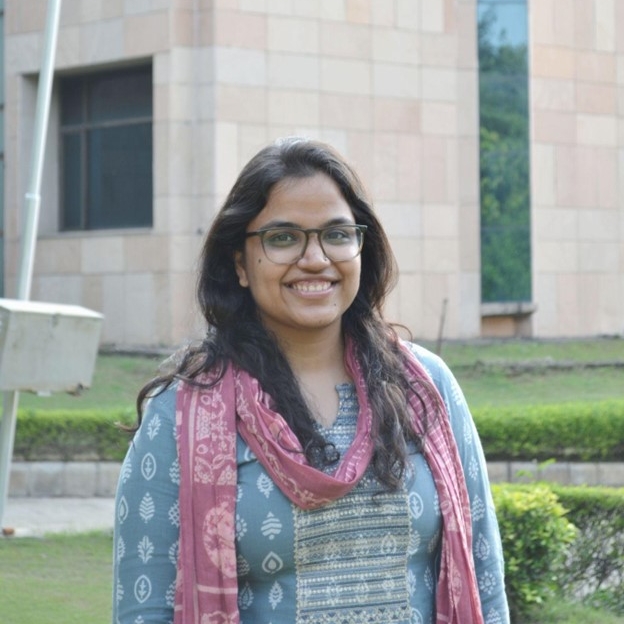 Mandavi Pandey
Mandavi Pandey
Mandavi Pandey is the First Author of A lipid synthase maintains metabolic flux for jasmonate synthesis to regulate root growth and phosphate homeostasis published 27 August 2024. Pandey is a Ph.D. student at National Institute of Plant Genome Research. Education background includes: 2021 started till now Ph.D under Dr. Jitender Giri at National Institute of Plant Genome Research; 2021, passed M.Sc in Botany at Banaras Hindu University; 2019, passed BSc in Botany(Hons.) Zoology Chemistry at Banaras Hindu University. Research interests include Plant Molecular Biology, Plant Biotechnology, Genome editing, Plant nutrition Biology, Lipidomics, Plant metabolomics. Personal interests include Writing, Singing, dancing, painting .
“I am a person from Varanasi district of UP state in India. We are mostly the people of the village, and have a daily life around plants, trees and croplands and farms are what we do being born in a family of farmers. This always made me feel connected to plants. Moreover my both sisters were also from a plant science background which also inspired me to pursue it further. It is the childhood love which grew further with time.”
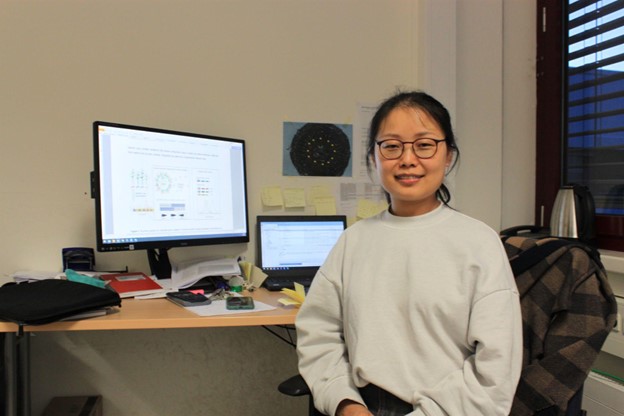 Yaping Zhou
Yaping Zhou
Yaping Zhou (she) is the First Author of Cold mediates maize root hair developmental plasticity via epidermis-specific transcriptomic responses published 27 August 2024.She is a postdoctoral researcher at University of Bonn. Education includes 2020 Ph.D Nutritional Crop Physiology at University of Hohenheim; 2015 MSc in Plant Nutrition at China Agricultural University; 2013 BSc Biology Xinjiang University. Research interests are Plant nutrition, Abiotic stress, Plant genetics. Personal interests are yoga and hiking.
“I was born and raised in a small countryside in Xinjiang province, China, where most of the soils are alkaline and salty. Moreover, frequent droughts also occurred naturally. Despite these harsh conditions, the native plants exhibited strong and healthy growth on this soil. Since I was very young, I have been impressed by their tenacious vitality, which intrigued me and made me want to understand how they adapt to such a harsh environment. Therefore, I chose to study biology at university to uncover the secrets of these plants.
From 2013 to 2019, I pursued my master’s degree at China Agricultural University with Prof. Dr. Chunjian Li and completed my PhD at the University of Hohenheim in Germany with Prof. Dr. Uwe Ludewig, majoring in plant nutrition. Since 2020, I have been a postdoctoral researcher at the University of Bonn, working with Prof. Dr. Hochholdinger to study the genetic regulation of maize roots in response to abiotic stress. I hope this knowledge will help breed stress-resilient crops and increase yields under unfavorable conditions.”
Deeksha Singh
Deeksha Singh is the First Author of REPRESSOR OF UV-B PHOTOMORPHOGENESIS proteins target ABA INSENSITIVE 5 for degradation to promote early plant development published 28 August 2024. Singh is a Postdoctoral scientist at University of California, Riverside. Education background includes Ph.D Plant developmental biology. MSc- Microbiology, BSc- Life sciences. Research interests include Developmental biology, Abiotic stress, Photobiology and hormone signaling. Personal interests include Badmintion, Hiking, cooking.
“My interest in plant science began during my undergraduate studies when I was captivated by the ways plants adapt to their environment. I am passionate about this field because it integrates molecular biology and environmental science, both of which are crucial for tackling agricultural challenges.”
 Waseem Abbas
Waseem Abbas
Waseem Abbas is the First Author of A quantitative trait locus GWY10 controls rice grain width and yield published 29 August 2024. Abbas is a Postdoctoral researcher at Guangdong Provincial Key Laboratory for Plant Epigenetics, College of Life Sciences and Oceanography, Shenzhen University, Guangdong Province, Shenzhen.
Education background includes: 2010-2014, BSc (Hons) in Agriculture from University of Agriculture Faisalabad. 2014-2016 M.Phil. in Biotechnology from University of Agriculture Faisalabad. 2016-2024, PhD in Genomics from National Key Laboratory of Crop Genetic Improvement, Huazhong Agricultural University. Research interests include Plant Genetics and Genomics.Personal interests include Golf, Table Tennis and Running.
“Since childhood, I have had a great love for plants. During my primary school, I have enjoyed caring for potted plants and growing vegetables and seasonal flowers, which brought me great comfort. My beloved mother, who passed away last month, was a true inspiration for me.”
Di Qinghua
Di Qinghua (she) is the First Author of RESPIRATORY BURST OXIDASE HOMOLOG 5.1 regulates H3K4me3 deposition and transcription after cold priming in cucumber published 29 August 2024.She is a PhD at the Institute of Vegetables and Flowers, Chinese Academy of Agricultural Sciences. Education background includes 2023 Ph.D Institute of Vegetables and Flowers, Chinese Academy of Agricultural Sciences; 2017 MSc ShanDong Agricultural University; 2014 BSc ShanDong Agricultural University.
Research interests include Abiotic stress; Graft; Cold Stress. Personal interests include Badminton and handwriting.
“I am pursuing a doctoral degree jointly cultivated by the Institute of Vegetables and Flowers of the Chinese Academy of Agricultural Sciences and China Agricultural University. Under the guidance of Professor Yu Xianchang and Associate Researcher Sun Mintao, I conduct research on low-temperature stress in vegetables, with a focus on the physiology and molecular biology of vegetable stress.
Plants can maintain acquired cold tolerance after cold priming for a long period, even after resumption of warmer temperatures. Transcriptional memory is associated with specific epigenetic remodeling and changes in chromatin markers in response to stress. Here, we found that in cucumber, cold priming altered the Histone H3 lysine 4 trimethylation (H3K4me3) signal of sustainably induced (memory) and non-sustainably induced (NSI) genes during recovery, and H3K4me3, on the upregulated memory gene, exhibited a specific epigenetic memory during recovery. However, the rank of the H3K4me3 signal on memory and NSI genes in the genome was independent of cold priming, which always contributed to and inhibited the formation of transcription patterns of memory and NIS genes, respectively, showing a bidirectional transcriptional mechanism of cold priming. This mechanism may support cucumber to better balance the cold tolerance and growth and development during cold stress memory. Further study revealed that short-lived increase of CsRBOH5.1 expression during recovery after cold priming was essential for cucumber maintaining a high-level of NADPH oxidase activity and apoplast H2O2 content, causing cucumber to acquire cold priming and enhancing the maintenance of acquired cold tolerance. Interestingly, the expression of some key H3K4me3 methyltransferase genes, and the accumulation of H3K4me3 on memory genes depended on CsRBOH5.1. Surprisingly, CsRBOH5.1 was essential for almost all genes to form the normal H3K4me3 signaling patterns during recovery, and the necessity was more obvious with the extension of recovery. Moreover, transcriptional-memory in Csrboh5.1 mutants was completely lost, and the transcriptional patterns of about 80% of NSI genes were disrupted. Our work provided a new framework for the study of stress domestication and stress memory.”
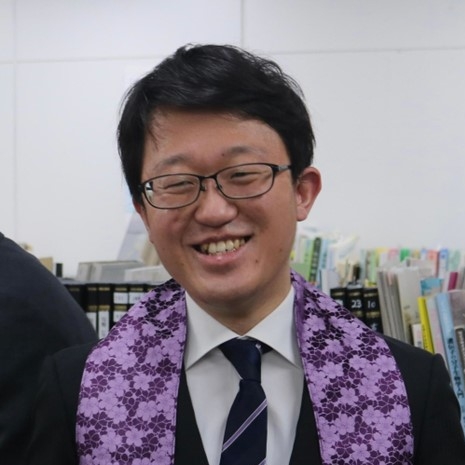 Daisuke Shimamura
Daisuke Shimamura
Daisuke Shimamura (he/him) is the First Author of Periplasmic carbonic anhydrase CAH1 contributes to high inorganic carbon affinity in Chlamydomonas reinhardtii published 30 August 2024.He is a Postdoctoral Researcher at RIKEN Center for Sustainable Resource Science. Education background includes 2017 BSc in Agriculture at Kyoto University, 2020 MSc in Biostudies at Kyoto University, 2023 Ph.D. in Biostudies at Kyoto University
Research interests include biophysical CO2-concentrating mechanisms. Personal interests include traveling, reading and watching movies.
“I love plant science because it combines fundamental biology with practical applications that can benefit society.”ural and environmental challenges.”



